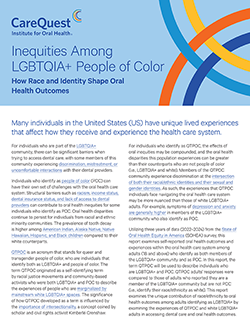How Race and Identity Shape Oral Health Outcomes
This report, based on results from CareQuest Institute’s State of Oral Health Equity in America survey, examines the oral health experiences and outcomes of adults identifying as both LGBTQIA+ and as people of color (POC).
Survey results show that inequities individuals face when they belong to a sexual/gender minority and a racial/ethnic minority have a compounding effect on oral health disparities. More specifically, adults who identify as queer and transgender people of color (QTPOC) were less likely to have an annual dental visit, less likely to have a dental home, and more likely to seek dental care in an emergency department than white LGBTQIA+ adults.
Adults who identified as QTPOC were also:
- More likely to have experienced discrimination in a dental setting or have been denied oral health care due to discrimination.
- Significantly more likely to experience at least one oral health symptom in the last year, such as toothaches and bleeding gums.
- More likely to feel self-conscious or embarrassed about their oral health.
The authors write:
The higher percentage of QTPOC adults who report being denied oral health care due to discrimination suggests the need for the oral health workforce to be more diverse and be more competent in providing care that is more sensitive to patients’ intersecting identities.”
You may also be interested in:
- Caring for LGBTQ+ Patients: Five Tips and a Look at the Latest Data, a blog post with practical strategies to help oral health professionals create safe and inclusive environments for patients of all identities and orientations.
- Oral Health and the LGBTQ+ Community: A Snapshot of Disparities and Discrimination, a report examining the oral health experiences of individuals identifying as LGBTQ+.
- Does Our Oral Health Care System Welcome Everyone?, a report exploring various socioeconomic factors that continue to create barriers to equitable oral health care for millions of people in the US.
